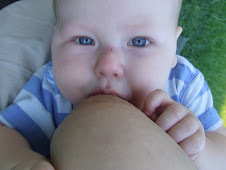skip to main |
skip to sidebar
Solids: The When, What and HOW.
WHEN?
The AAP states that all infants should be exclusively breastfed for 6 months of life and then at least a year or however long is mutually desired.
Many people don't fully understand what "exclusively" breastfeeding means. It means nothing but breastmilk: no formula, no solids.
Why wait 6 months, why not 4?
A baby's digestive tract matures enough for solid foods (those that aren't breastmilk) between 4 and 6 months of age. Waiting until 6 months ensures your baby's digestive tract can tolerate solid foods. Many of the problems associated with early solids do not show up until later in life and many parents and/or doctors never make the association. It's thanks to many years of studies and the advanced knowledge we've gained about infant's bodies that we know waiting the six month MINIMUM is ideal for optimal health, now and in the future.
Another point often left out of the solid discussion is watching for signs of readiness. Just because your baby is 6 months old doesn't mean they are ready, and just because they've met all the signs of readiness doesn't mean you shouldn't wait until they are 6 months old.
Signs that indicate baby is developmentally ready for solids include:
* Baby can sit up well without support.
* Baby has lost the tongue-thrust reflex and does not automatically push solids out of his mouth with his tongue.
* Baby is ready and willing to chew.
* Baby is developing a “pincer” grasp, where he picks up food or other objects between thumb and forefinger. Using the fingers and scraping the food into the palm of the hand (palmar grasp) does not substitute for pincer grasp development.
* Baby is eager to participate in mealtime and may try to grab food and put it in his mouth.
Baby really needs most/all of these stages to be met as WELL as the 6 month minimum age before they're ready for solids.
A reminder: Solids are *only* for exploration and taste in the first year. They do not replace breastmilk, they are not a nutritional supplement to breastmilk and they should always be given AFTER nursing session. Solids are the first step in weaning.
For more information on solids, visit this great link:
http://www.kellymom.com/nutrition/solids/solids-when.html
What have you learned over the years as to how to approach solids? Did you learn anything knew today? What questions might you ask?
WHAT?
Most parents today think the first introduction to food should be fortified rice cereal. Many pediatricians praise that little box of mush. But, how good IS rice cereal, or any cereal, for your little baby?
More on rice cereal: http://www.homemade-baby-food-recipes.com/best-first-food-for-baby.html
You can SKIP the cereal altogether and go for healthy, fresh foods instead. Remember that some foods are unsafe for infants (eggs, peanut butter and milk. Dairy can be added around 9 months old in the form of yogurt, cheese, etc).
Avocado is a great first food as it's mostly bland and high in natural fats, which are important for a developing infant. Many moms will mix breastmilk with their first solid feedings, but it's not necessary. Read your baby, watch for their cues. Let baby take the wheel, too, with exploring solids and don't be afraid of the mess.
Always wait a few days between new foods to watch for possible allergies/reactions and don't over-feed solids.
HOW?
Like I said, let baby take the wheel. Put some food down in front of him/her, sit next to them and watch him explore and enjoy. If baby has met the required milestones for starting solids, then they should be able to pinch and put to mouth any bits of food. If they are unsure of what to do, offer a little taste to intrigue them.
Take it SLOW.
There is no rush to get your baby to eat food. They are getting all the nutrition they need from your milk, this is just for fun and to help them learn so that by about a year old, they are able to eat more meals.
It's always important to listen to your baby, but you have to maintain a sense of responsibility.
Your baby COULD over eat, so don't let them eat more than an ounce or two.
Always wait at LEAST 6 months and make sure all milestones of solids readiness are met.
Avoid known allergens and always watch for reactions no matter what it is you've fed them.
Always wait a few days between trying new foods.
Don't rush, go at your baby's pace.
Have fun!










No comments:
Post a Comment